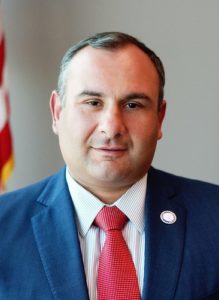Moving School Elections Back to April is in the Best Interest of Parents, Students and Taxpayers
By Tony Fiore, Deputy Mayor, Middletown, NJ
In 2012, the Middletown Township Committee voted on a resolution to be a part of what was an initial pilot program to move the local Board of Education Election from April to November. The benefit of entering that program was that election costs could be saved for the Township while school budgets would not be subject to voter approval so long as they complied with the 2% cap.
After 6 years of election data, it has become clear the potential benefits of this change do not outweigh the unintended fiscal and political costs of continuing to elect Board of Education members during a partisan electoral cycle.
School taxes represent nearly 65% of the tax bill, but candidates are almost invisible on the ballot. Roughly 65% of our tax bill is allocated towards school taxes. The past few years have shown that candidates running for Board of Education positions are on an uneven playing field on a November ballot despite overseeing a budget nearly three times the size of the Township’s. In 2018, for example, 52% of Middletown voters voted in the US Senate race, 51% cast a ballot for Township Committee while only 42% cast a ballot for the Board of Education, a significant drop. The reason for this may be two-fold. First, Board of Education candidates do not have the fundraising capacity to raise nearly the amount spent by federal, state, county, and local Township Committee candidates. As someone who has ran for office several times, I can assure you that in a town the size of Middletown it takes significant money to run a campaign and get people to know and learn about who you are and what your platform is for the intended office. With hundreds of thousands (if not millions) of dollars being spent on federal, state and other races, it is virtually impossible for voters to learn about these candidates when all other candidates up ballot are seeking our attention. As a taxpayer, we deserve to know about these candidates and having a dedicated non-partisan April election would easily solve this dilemma.
Ballot position has proven to be more important than the potential candidate in November elections. Since 2012, ballot position has become more important than potentially each candidate’s platform as those who obtained the 1st ballot position have been successful 75% of the time. In fact, only twice has a candidate been unsuccessful for the position while running in position #1. Ballot positions #2 and #3 are the 2nd and third most successful spots. Meanwhile, those numbers significantly decrease after position #3 to under 50%. Should the luck of the draw be what decides the fate of our tax dollars and our children’s education or should we have the ability to learn more about candidates in a dedicated election? The answer is quite simple.
An April election would provide full transparency into the school budget. Remember when budget presentations were held several times at multiple locations when the voters had to decide on the budget? Now we are fortunate to have one budget presentation in total because we as voters have no ability to vote on the budget so long as the budget “complies with the 2% cap.” With regards to the 2% cap, is it really a cap? Middletown school taxes have risen 3.65% in 2017, as a well as 3.12% in 2015. In fact, over the past 4 years the average tax increase for schools is 2.47% in excess of the 2% number. I am not passing judgement on exceeding 2%. What happens if the board actually needs more? A move to April takes away this phantom cap. If the taxpayers approve the budget, the budget passes. If the voters do not approve the school budget this allows for even greater transparency as the Township Committee would be forced to review the budget and make recommendations based on community input.
There is no place for politics in our schools. The recent election of 2018 is a classic example of politics clearly being inserted in the process. In the last election, 3 candidates ran as a bracketed ticket and were funded by a 2017 Assembly account from a major political party. One candidate didn’t really seek the position, openly refused to participate in any forums or requests for information, yet received over 7,800 votes because he was aligned and funded in signs and mailers by a major political party. His running mate (the former candidate for General Assembly in 2017) was successful. What’s next? Endorsements by major political parties for school board members? As a parent, politics and outside political interests have zero place in the decisions made for our children’s education. A move back to non-partisan dedicated election is the only way to preserve and protect our schools from this occurring.
What is the true cost to moving the election to April? I must admit that I chuckled a bit when I read Dr. George’s letter dated 1/4/2019 regarding the cost of an April election. I distinctly remember a few short years ago Dr. George not waiting until November to pose a $30m+ bond referendum to save electoral costs. Instead, the Board of Education held a special election in March to vote on the referendum and gladly paid the election cost. Anyone who knows me or knows my record knows that I am all about saving every taxpayer dollar possible. While there will be a small cost to bring back April elections (roughly $40k on a $164 million-dollar budget), the cost pales in comparison to the transparency that will once again be restored with candidates and the budget process.












Agreed. Most of the time the residence either don’t know there is a BOE election it they’re cold, tired and hungry coming home from work and don’t want to take time to vote on a cold winter February night.
The Township Committee can have a bigger influence on who is elected to the BOA due to fewer voters. Keep the Dems out!
I am confused. Are you saying the Middletown voters who vote for the school board in November are not smart enough to research the candidates and just vote top of the line? These are the same voters who vote to keep the Township Committee Rebublican each November Election. I remember when we used to vote on the Budget and it is a waste of time. Does the 2% cap go away if we vote on the Budget? Could that lead to a larger budget that gets voted on by the few people who show up in April? We elected this school board and they should decide when the School Board election is held.
The Democrats are the ones who are politicizing the Board of Education. Look at who they put up this year and used democratic campaign funds to help elect a slate of Democrats. The only thing that matters to Democrats is gaining power. The only thing that matters to Phil Murphy is taking over Republican towns. We can’t let that happen
That is why I for one applaud this move to lower voter turnout and have the Township Committee heavily influence who gets on the Board of Ed. Keep Middletown Republican at any cost!
Yes, most people don’t research. You ever heard the tag “low information voters?”
WORSE, the amount of money needed for school board elections in November to cut through the political clutter grows exponentially. Most School Board candidates are moms and pops, not interested in long term political futures. They don’t have the kind of money or networking needed to raise the funds to do that. What’s left? Turning to political machines to ally themselves with to raise their name recognition and or funds?
https://m.facebook.com/groups/384132451708964?view=permalink&id=1958684464253747&src=email_notif
Just wondering, why didn’t Mr. Fiore let the voters know about this plan in November? Sudden brain fart?
big mistake to move school boards to November, imho: as it is, stats show that voting falls off, as they go down ballot, so there’s a disinterest/ lack of focus on the school candidates..plus, people can’t vote for the main thing that keeps raising our taxes: the usually annoyingly-bloated budgets. Hoping they go back to April.. Am for the party paying attention to and helping whom they put on those boards, since many future council candidates have come from past school board service- a basically thankless job with no pay, but a learning curve that’s sometimes helpful, in the long run.